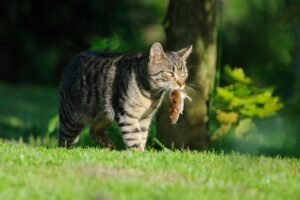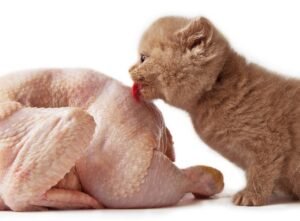Many people question why pet owners tend to buy commercial foods for their feline rather than opting to a home cooked diet for cats, offering natural fresh meats.
The main reason is it is way easier to open a can of cat food or pour kibble, than preparing a homemade meal for a cat. But also, cat food is formulated to offer a balanced diet for felines. It has more nutrients required by cats than just ‘meat’.
The interest in homemade food for cats is on the rise. It is important to realize, however, that homemade pet food does not always mean healthy.
Let’s delve into why this is so…
Obligatory Carnivores
 Cats are obligatory carnivores. They do require essential nutrients in meat to live. Without meat they will get ill.
Cats are obligatory carnivores. They do require essential nutrients in meat to live. Without meat they will get ill.
Cats need more than just the ‘muscle meat’. Most people, when giving fresh meat to their cats, only offer ‘muscle meat’ and think that this is all they require to survive.
When cats hunt, they do not selectively eat only the mouse steaks or bird fillets. They eat much more of their prey, including the organs, intestines and bones. Pretty much everything!
Minerals from bones
Cats get much, if not all, of their calcium from bones (and other minerals). Cat stomach acids leach these minerals out of the bones.
The bones are frequently enveloped and regurgitated in hairballs – as well as whatever fur or feathers the cat may have also swallowed. If some bones end up passing into the lower digestive tract they are typically already demineralized and softened.
That does not mean that a cat can never get harmed by bones. Or that it is a good idea to offer your cat bones from a cow, or large chicken bones – especially if they are cooked.
The bones that cats can manage to eat safely are small. They need to be small enough that they can chew through them. Think mouse sized!
What happens when giving cats a home cooked diet for cats with just meat?
 A mistake that well-meaning people make is the feeding of unbalanced homemade diets.
A mistake that well-meaning people make is the feeding of unbalanced homemade diets.
That is because when making cat food from scratch, many people fail to balance the meat with the correct amount of calcium, forgetting that in the wild, a cat would be eating both the meat and bones of their prey, thus providing a proper calcium-to-phosphorus ratio.
A cat diet too heavy in tuna, liver, or liver oil (such as cod liver oil), can lead to vitamin A toxicosis, resulting in bone and joint pain, brittle bones, and dry skin.
A diet too rich in raw fish can destroy vitamin B1. This can cause muscle weakness, seizures, or even brain damage. If a cat owner wishes to make their pet’s food, they need to understand and follow a properly balanced recipe.
This is similar to well-meaning people rescuing and raising wildlife. For example, with baby owls: when fed just meat, the owlets’ bones don’t develop properly. There have been instances where hand raised owlets have been found to be in such a poor state that their soft boned legs are unable to support them. Owls eat a similar diet to cats in the wild. They also consume all parts of their prey’s body.
Rather than a home cooked diet for cats, what about a raw diet?
In addition to the risk of nutrient deficiencies, raw diets pose other risks for cats. Any bones not completely ground up could cause intestinal blockages or even lacerations.
Plus, raw foods are more likely to be contaminated with harmful bacteria like Salmonella, E. coli and Listeria. The food requires careful consideration with storage and refrigeration.
A true home cooked diet for cats
A true homemade diet for cats must include much of what a feline in the wild would eat: muscle meat, organs and bones. Uncooked wild prey is high in protein and moisture. It also contains essential substances that are found in meat, such as taurine, fatty acids, vitamins and minerals.
Are all commercial cat foods good for your cat?
Throughout our website we review many different cat foods. When looking at ingredients it is clear that there are many excellent commercial cat foods on the market carefully formulated by animal nutritionists and provide a full spectrum of nutrients to keep cats healthy.
Also, there are some that we feel don’t offer a healthy balanced diet, or have ingredients that are not naturally found in a cat’s diet. Some cat foods are bulked-up using grains and vegetables, which are not ideal for carnivorous cats.
It is important to read the ingredient list to identify what is in the food and where it is sourced from. Artificial coloring, flavors and preservatives may also be harmful. Seek foods with natural additives.
The first ingredient should always be a quality real meat. Avoid meat meal substitutes.
Also, seek foods that include organ meats and have a range of essential ingredients such as amino acids, minerals, taurine and vitamins.
If giving your cat tinned foods with oily fish, then look to also provide foods that don’t contain fish. This will reduce the risk of vitamin deficiencies.
Refer to our ‘Cat Food Appraisal Tool’ to better understand what to look for in a quality cat food – and more importantly, what to avoid!
Final thoughts
Whether you choose to buy a quality commercial pet food or decide that a home cooked diet for cats is best, it is essential to do your homework to ensure the food is safe and offers a well-balanced diet.
To add variety to your cat’s diet, you could consider offering your pet a mixture of home cooked and commercial foods. That way you’ll cover all bases and keep your cat interested!






